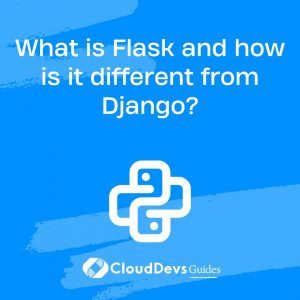What is Flask and how is it different from Django?
Flask and Django are two popular web frameworks in the Python ecosystem, but they serve slightly different needs and philosophies in web development.
- Flask:
– Overview: Flask is a micro web framework. The term “micro” doesn’t mean that it’s lacking in functionality, but rather emphasizes its simplicity and modularity. It provides the essentials for web development without imposing a specific structure or components.
– Philosophy: Flask believes in giving developers the flexibility to choose how they want to implement things. It doesn’t come with built-in tools for database abstraction, form validation, or many other functionalities provided by larger frameworks. However, this means developers have the freedom to choose the libraries and tools that best fit their application.
- Django:
– Overview: Django is a high-level web framework that follows the “batteries-included” philosophy. This means that, out-of-the-box, Django includes a wide array of features to handle many of the common tasks in web development.
– Philosophy: Django’s approach is “convention over configuration”. It provides a default structure for web applications and comes with an ORM, an admin interface, and many other built-in features. This can accelerate development since many standard features are immediately at hand, but it also means that developers might have to invest time in learning the “Django way” of doing things.
- Comparing The Two:
– Flexibility vs. Features: Flask offers more flexibility, making it a great choice for smaller projects or when you want more control over the components you use. Django, being feature-rich, is ideal for developers who want a framework that handles many aspects of web development for them.
– Learning Curve: Flask’s minimalistic nature often makes it easier for beginners to grasp. Django, due to its breadth, can have a steeper learning curve, but it also offers more once you get past the initial stages.
Both Flask and Django are powerful tools for web development in Python, and the choice between them largely depends on the project needs and the developer’s preferences. Flask offers flexibility and simplicity, while Django provides a comprehensive suite of tools for rapid and structured development.







